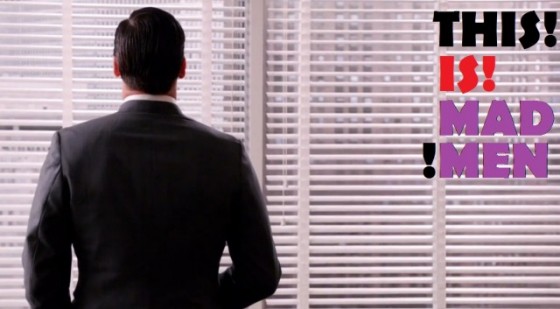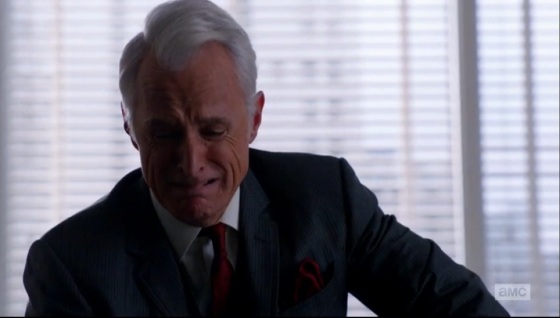This! Is! Mad Men! – The Doorway
[This! Is! Mad Men! recaps the most recent developments of Don Draper and his lovable gang of sleazeball advertisers. In the spirit of the show, the post itself may very well be drunk. And sexist. Apologies ahead of time.]
Oh, Mad Men, how I’ve missed every aspect of your beautiful face, not even excepting the five o’clock shadow and booze-breath and tobacco stains.
AMC must know that we’ve been champing at the bit for more spiritual ruin on Madison Avenue, as they deliver a sixth season premiere guaranteed to sate even the most ravenous of televisional appetites. The Doorway never relents, using absolutely every second of its two-hour running time to remind us why love the characters. And how is this done, you ask? Why, by thrusting them into the midst of existential crises! Duh!
C’mon, let’s take a look at the last episode of Mad Men!
So what’s this season’s starting point? Well, if you’ll recall, the fifth season ends with on some depressing-as-fuck notes – Lane Pryce commits suicide, Joanie whores herself out to a client, and all of Don’s progress is in question as he flashes his skip-a-heartbeat philanderer-smile. Given such a bleak context, The Doorway easily could’ve swung to one extreme or the other, with characters either wallowing in the deepest nadirs of their lives or finally reaching the summits. However, creator Matthew Weiner wisely crafts a tale that keeps all hands on deck while attempting to navigate through turbulent seas.
But before waxing philosophic about these existential maelstroms, why don’t we run through some of the basic premises?
The Doorway sees Sterling Cooper Draper Pryce flourishing as it never quite has before. There’s all sorts of buzz around the office, as copywriters smoke reefer and publicity photos are taken and newcomer Bob Benson does whatever he can to be noticed by the big-shots. After being given a transcendent Hawaiian vacation by a client, Draper pitches an ad for their hotel chain that is incredibly morbid in its not-so-obfuscated subtext (more on Draper’s death-fears later). Although most of the crew from SCDP is still intact, Megan Draper has moved from secretary to copywriter to soap-opera actress, and Roger Sterling spends much of his time at the office with his psychologist even before his mother kicks the bucket.
Outside of the office, there’s quite a bit going on. Peggy Olsen is finding her groove at another agency, showing Draper-esque composure when a client panics over a campaign that may or may not inadvertently conjure up images of Vietnam War atrocities. Moving even further away from SCDP and into the suburbs, Don’s ex-wife Betty is trying regain her understanding of self. Betty searches for a friend of Sally’s who flees into the NYC bohemian scene, only to realize that maybe there is some veracity to the street urchins’ assessment of her as a coddled, paint-by-numbers housewife.
Even at this cursory glance, it’s clear that this season of Mad Men is going to weave more than few yarns together. Hell, we still need to find out what’s really going on with Joanie and Pete and Harry and Cosgrove. But how about some of the heavier thematic content?!
First on the theme-platter is Roger Sterling. Just as season five saw him exploring his mind via LSD, this first episode introduces a Sterling who is willing to speak with a psychologist. At best, the Sterling is able to verbalize his feelings of ennui, the concerns that life is not a path with any destination but merely a series of doorways which only lead to more doorways. Unfortunately, Sterling spends most of his session-time trying to mask his truest feelings by relying on humor and deflection. In fact, this trend continues as Sterling’s secretary informs him that his mother has died, and he rigidly assures her that everything’s okay.
Although Roger is certainly adept at wearing the mask of detachment, that motherfucker is torn from his face along with the top layer of skin. At the memorial service for his mother, Roger loses his cool, first thrown off by Don’s booze-inspired vomiting and then enraged by the appearance of his ex-wife’s new man. Before all is said and done, Roger abruptly ends the service, kicks everyone out, and screams, “THIS IS MY FUNERAL.”
Yikes.
Tears, naturally, ensue.
On a more literary note, it should be noted that Peggy’s original pitch for a headphones campaign is centered around the “Friends, Romans, countrymen…” speech from Julius Caesar. If you recall, this is the speech that Mark Antony delivers to the hoi polloi, effectively gaining favor by simultaneously honoring the legacy of his fallen friend and tearing apart Brutus’ words. It’s some gangsta shit. But what does this mean for Peggy Olsen? Well, on the one hand it may be a subtle nod to the fact that she is a master rhetorician, capable of molding her words to fit any framework necessary. On the other hand, the fact that the Shakespearean reference is ultimately scrapped could indicate that she does not yet need to play the role of Antony, as perhaps her Caesar (Don Draper) has yet to be knifed in the senate.
Which isn’t to say that Don’s feeling good about the prospect of his eventual demise.
In fact, The Doorway opens with a POV shot of a heart-attack victim being worked on by Dr. Rosen (Don’s neighbor and friend). The very next shot sees Draper sitting on a beach in Hawaii, reading The Inferno‘s first lines to us via voice-over:
Mid-way in our life’s journey, I went astray from the straight road and woke to myself alone in a dark wood.
By coupling Dante’s infamous words with nearly ten minutes of immaculate silence, Don Draper is cast as incredibly reflective. For this time, Don Draper is his own Uatu, resisting nothing as he drinks and smokes weed and makes love to his wife. It’s not a stretch to imagine that Don is looking down from his life’s summit (which was ascended in strained light) and fearing that the descent will be wholly dark.
Hell, the taciturn demeanor is only thwarted after a drunken soldier on R&R asks Don to attend his wedding the next morning so as to give away the bride. Don initially refuses, thinking it odd that he be given such a responsibility. However, he eventually caves in as the soldier says he’ll someday pay the favor forward by being “The man who can’t sleep and talks to strangers” for someone else.
Poignant.
With that being said, I find that the drunk soldier made a much more appropriate analogy when he chided Don about being “some kind of astronaut.” The science fiction fortifying my skull throbs with delight to think about Draper as the embodiment of a space-man — he’s of the Earth but no longer feels connected to it, observes from a distance, and can’t quite quell the terror racing through his heart when gazing into the abyss.
This fascination with death sees Draper imbibing himself into a stupor before the memorial service for Sterling’s mother, drunkenly asking the doorman who heart-attacked what is was like to be dead, and asking Dr. Rosen what it’s like to regularly look death in the face. Rosen, in a kindhearted gesture, declares himself to be no braver than Don, and says that “People will do anything to alleviate their anxiety.”
And then the episode ends with Don alleviating his anxiety by sleeping with Rosen’s wife.
In revealing Don to be in the midst of a long-term affair, Mad Men has officially subverted some of the viewers’ expectations from the pilot. Don’t you remember what went down at the end that episode? We spent the whole episode thinking Don was a swingin’ bachelor only to see him climb into the warm bed he shares with his wife. We’ve seen Don Draper embracing life by any means, even if it meant strange beds and new identities, and now it looks like Don’s going Nate Fisher in the hopes of avoiding death.
As we see him standing at the threshold of The Doorway, we have to wonder – who is Don Draper? Dante lost in the woods? Caesar on the Ides of March? Or lonely Dick Whitman, just trying to find his place in the world?





